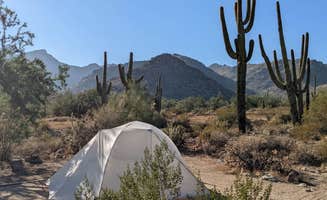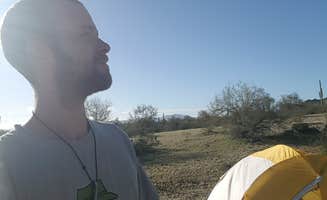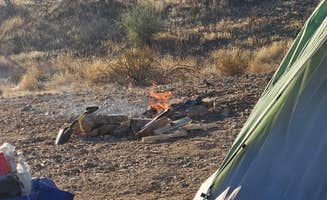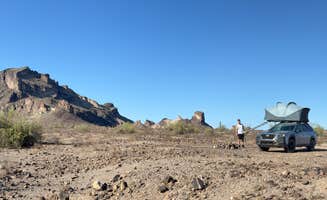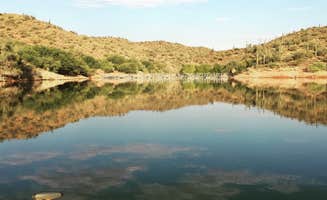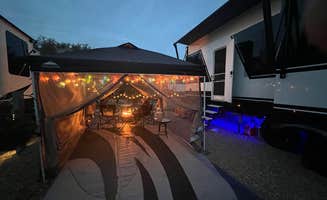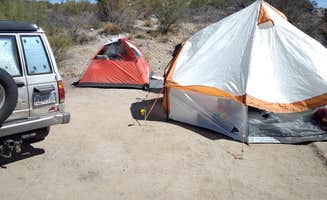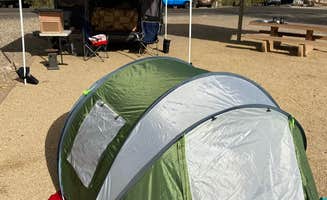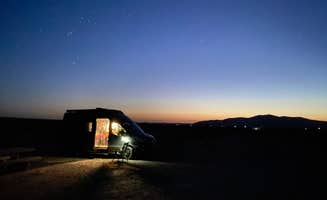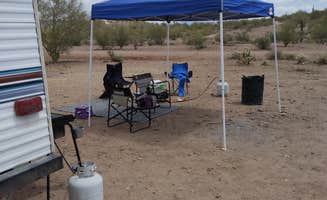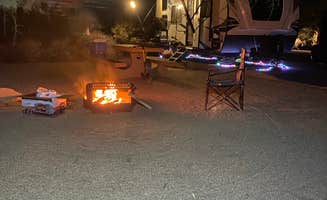The Buckeye area offers distinctive desert camping options on the western edge of Phoenix at elevations around 1,100 feet. Camping spots in this region feature sparse vegetation dominated by saguaros, creosote bushes, and ironwood trees. Most established campgrounds remain open year-round, though water restrictions often apply between May and September due to regional drought conditions.
What to do
Hiking at White Tank Mountain: Trails range from accessible paths to challenging routes with varied terrain. "The park has beautiful hiking trails and a great nature center, which offers activities and the regional library. There are a couple of playgrounds in the park as well," notes Ellen W. about White Tank Mountain Regional Park.
Stargazing after sunset: Limited light pollution creates optimal viewing conditions at several campgrounds. "Stargazing is quite nice. However, it's also apparently under a flight path for Luke Air Force Base, and I had several noisy jets pass overhead just as I was settling in for the night," reports a camper at Skyline Regional Park.
Rock collecting expeditions: The desert terrain contains interesting geological specimens. "We rode our E bikes all over and did some agate hunting with wonderful success!" shares Wendie K. about her experience at Saddle Mountain BLM.
What campers like
Desert wildlife viewing: Wild burros and desert birds frequently visit campsites. "Burros would hang out in our camp grazing grass completely unfazed by the barking dogs and screaming kids," mentions Tom W. about his stay at Lake Pleasant Regional Park Campground.
Convenient proximity to services: Many sites offer a balance of desert solitude with nearby amenities. "Convenient to gas, RV dump, hardware, grocery, restaurants," notes a reviewer about Skyline Regional Park, highlighting practical benefits for longer stays.
Citrus trees at RV resorts: Some developed campgrounds feature unique landscaping. "Orange, lemon, and grapefruit trees everywhere. They have 2 fenced dog runs. Pretty pool and hot tub. People are very friendly and helpful," says Missy C. about Destiny Phoenix RV Resorts.
What you should know
Summer heat limitations: Temperatures regularly exceed 100°F between May and September. "We stayed for one night (June 4) and it was over 100°F," reports Chandra D. about Luke AFB Famcamp, highlighting the summer reality.
Flight noise considerations: The area sits beneath several air traffic routes. "It's under a flight path from Phoenix to San Diego/Los Angeles, so every few minutes a jet blinks through your sky space," explains one reviewer about the Buckeye area.
Seasonal crowds: Weekends and winter months see increased visitor numbers. "By 7 am on a weekend in early April, the day-use parking lot was completely full. Despite this, we did not see too many people on the trails," observes Lee D. about White Tank Mountain.
Tips for camping with families
Pool access for cooling off: Several RV parks offer swimming facilities. "The pool is refreshing and if you aren't into swimming there is a pool table, dog park and shuffle board to keep you busy," mentions Jen H. about her experience at Leaf Verde RV Resort.
Educational opportunities: Nature centers enhance the camping experience for children. "The park has a nice map of the available trails, covered ramadas with recycle containers along with trash receptacles, and even a shaded horse hitching post area with an automatic horse waterer," notes a camper about Skyline Regional Park.
Accessible trails for all ages: Some parks feature paved walking paths suitable for children. "There is a short (.6 mile) ADA-accessible trail. Horseback riding and mountain biking are also activities although we saw neither in our two days at this park," shares Lee D. about White Tank Mountain Regional Park.
Tips from RVers
Winter stay recommendations: November through March offers optimal camping conditions. "Site Quality: Generous-sized gravel driveways; Site D sloped uphill slightly. A concrete picnic table, BBQ grill, and fire pit complete the site," reports a reviewer about camping at Skyline Regional Park during cooler months.
Water conservation planning: Limited water availability requires careful usage. "There is no water. Neither potable or non-potable," warns Castaway I. about conditions at Skyline, emphasizing the need for bringing sufficient water supplies.
Cell service variations: Coverage differs significantly between campgrounds. "If you use Verizon, there is little or no signal most of the time," notes another camper about connectivity limitations in parts of the area.



